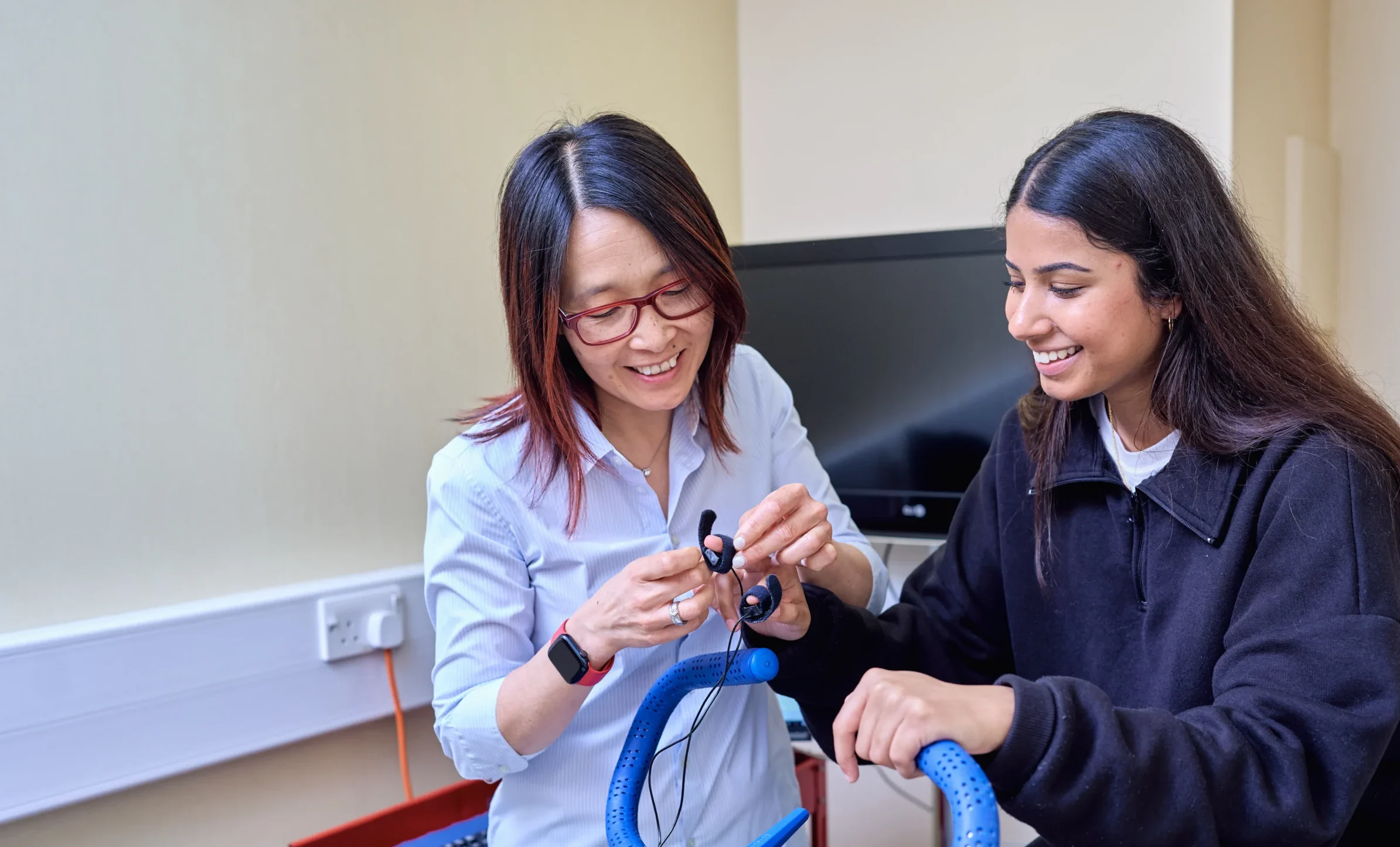

Bachelor of Science in Psychology
BSc (Online)
Whether you want to improve lives, advance social understanding, or shape the future of mental health and well-being, our flexible BSc Psychology programme equips you with the knowledge and tools to make a difference. Blending psychological theory with real-world insight, you’ll be empowered to succeed across people-focused industries. Learn from expert tutors, connect with a global community, and study on your terms through our immersive Digital Campus.

January, May, September
Apply now for any date

Pay nothing up front with a UK government loan available for eligible students, or secure your place with a deposit and pay monthly or in instalments

Four years (part-time)
Flexible distance learning

Total tuition: £21,435 - no hidden costs
Why choose this programme


Build skills that employers value: As a BSc (Hons) Psychology student, you’ll sharpen your communication, problem-solving and critical thinking abilities, while also learning how to analyse real-world issues and make sense of complex information. These transferable skills can open doors to a wide range of careers.
Unlock diverse career outcomes: Whether you’re passionate about healthcare, education, business, or the public sector, your psychology skills will open doors. Plus, with your unique insight into human behaviour, you’ll be ready to thrive in any career where understanding human behaviour is key.
Join a top-ranked programme with proven career success: Ranked 7th in the UK for graduate prospects in psychology (Complete University Guide, 2025). Aston University is your launchpad to real-world professional roles and rewarding career opportunities.
Globally accessible with flexible admissions: Wherever you are in the world, Aston University Online makes higher education within reach, with flexible study, monthly payment options, and non-standard entry routes that recognise the value of varied professional and educational experiences.
Study on your terms – anywhere, anytime: Enjoy the freedom of fully online learning with no fixed schedules or compulsory live sessions. Focus deeply on one module and assessment at a time, perfectly balancing your studies with work and life.
Understand people and behaviour in everyday contexts: Deepen your knowledge of what drives human thoughts, emotions, and actions. You'll explore a range of psychological perspectives and apply them to contemporary challenges – from mental health and wellbeing to decision-making, communication, and behaviour change – helping you make a meaningful impact in any professional setting.
Become part of a supportive, global learning community: Learn alongside a small, close-knit cohort with personalised guidance from expert tutors. Experience a welcoming, inclusive environment where you’re never studying alone.
Meet the programme director
Start your journey into the fascinating world of human behaviour with a programme designed to equip you with the knowledge and skills to understand, analyse, and influence human thought and behaviour. You’re about to begin an engaging and in-depth academic experience that will give you a strong understanding of human behaviour, covering everything from foundational principles to advanced research and applied practice.
The BSc Psychology programme offers an in-depth look at the complex interplay between biological, psychological, environmental, cultural, and social influences on behaviour, and aims to build your essential skills in research and critical thinking. All of our programmes are delivered online, offering you the flexibility to study at your own pace while benefiting from Aston’s commitment to high-quality teaching and student support.
Join a vibrant learning community and take the next step toward a rewarding career in psychology.


Programme overview
Have you ever wondered why people think, feel, or behave the way they do, including yourself? Whether it’s understanding what shapes our relationships, how we learn, why we remember some things and forget others, or what happens when mental health falters, psychology offers powerful insight into what makes us human.
Our online BSc (Hons) Psychology is designed for curious minds who want to explore these big questions and apply psychological science to everyday life. You’ll study the foundations of human behaviour, from memory and emotion to social dynamics and decision-making. As you progress, you’ll explore key mental health conditions such as anxiety and depression, and learn about the therapeutic approaches used to support people in need.
Throughout the degree, you’ll build core skills in analysis, research, and communication, as well as deeper knowledge of human behaviour. This foundation prepares you for a huge range of future career paths, from graduate roles in the private and public sectors to further study in psychology or related fields, opening the door to a world of possibilities.
Furthermore, our fully online, part-time programme gives you the flexibility to learn on your own terms – wherever you are, and whatever your schedule. You’ll study one module at a time, with dedicated academic support and a close-knit, global learning community by your side. With access to Aston University’s extensive e-library – featuring leading journals and publications – you’ll have everything you need to deepen your knowledge, develop your skills, and stay current with advances in the field.
Whether you're looking to enhance your current role, change career direction, or simply understand people better, this programme is your pathway to a more informed, impactful future.
What you will learn
Deepen your understanding of human behaviour: Expand your knowledge of human behaviour by combining theoretical insights with practical, real-world applications.
Learn essential psychology skills: Strengthen your expertise in critical areas such as research, analytical thinking, and data interpretation to excel in the field of psychology.
Cultivate versatile, career-ready skills: Develop practical, transferable abilities that can propel you toward success in a wide range of professional opportunities.
Explore contemporary social and psychological issues: Gain a deeper understanding of the pressing challenges and issues shaping individuals and society today.
Flexible payment plans and funding options

We are ranked in the top 5% of evaluated institutions
QS World University Rankings 2026
It’s been an exciting time at Aston University, with amazing new achievements that highlight our teaching excellence, outstanding student outcomes, and strong performance in global and UK rankings. Here are just a few highlights:
- Aston University is now ranked in the top 5% of global universities (top 5% evaluated institutions, QS World University Rankings).
- Aston University has been named the University of the Year for Student Success 2025 in the new Daily Mail University Guide.
- Aston University is 2nd in the country for Social Mobility (Higher Education Policy Institute).
And that’s just the beginning. Watch our video to discover more.
Reflecting on my time as a student at Aston University, I would say it was a truly worthwhile experience surpassing my expectations not only in the quality of teaching materials and the usability of the learning environment but mainly in the programme deliveries by Aston’s seasoned tutors.


Career prospects
Our BSc Psychology degree prepares you for diverse roles across healthcare, education, business, and the public and non-profit sectors. Pursue a career directly in psychology or apply your knowledge in other fields. Our graduates are among the highest-paid in the country, according to the 2023 Longitudinal Education Outcomes (LEO).
This degree offers flexibility across many professional paths. Graduates can go on to further training in psychology, using their degree to work towards roles such as clinical, educational, or occupational psychologist. Others choose careers in areas where understanding human behaviour is valuable.
Career prospects you can look forward to:
Psychological wellbeing practitioner: Support individuals with common mental health conditions like anxiety and depression, using a range of therapeutic interventions.
HR officer/People partner: Use psychology knowledge to support employee wellbeing, recruitment, training, and organisational behaviour.
Marketing and communications executive: Use behavioural understanding to shape consumer campaigns, user experience, and brand strategies.
Graduate entry roles in the public sector (Civil service, NHS, police, etc.): Apply psychological insight to shape public services, influence policy, and support communities across health, justice, and government sectors.


Programme structure
This part-time programme is studied over four years and includes 12 modules in total. Each module is worth 30 credits, with each credit of study equaling 10 hours of learning. This means each 30-credit module reflects 300 hours of learning.
Modules
Foundations and misconceptions of psychology'%3e%3cpath%20d='M11%2013H5V11H11V5H13V11H19V13H13V19H11V13Z'%20fill='%231C1B1F'/%3e%3c/g%3e%3c/svg%3e)
30 credits
This module provides an introduction to the historical and philosophical foundations of psychology. These foundations provide a lens through which you examine the diversity of approaches seen in contemporary psychology and some misconceptions that the general public often holds about psychological topics.
Biological and cognitive psychology'%3e%3cpath%20d='M11%2013H5V11H11V5H13V11H19V13H13V19H11V13Z'%20fill='%231C1B1F'/%3e%3c/g%3e%3c/svg%3e)
30 credits
This module provides you with a solid grounding in the core topics in neuroscience and cognitive psychology, using these topics as a foundation to introduce and develop some of the key academic skills required of psychology graduates.
Social and developmental psychology'%3e%3cpath%20d='M11%2013H5V11H11V5H13V11H19V13H13V19H11V13Z'%20fill='%231C1B1F'/%3e%3c/g%3e%3c/svg%3e)
30 credits
This module introduces you to theories, findings, and methods in cognitive-experimental social psychology, as well as the main theories of cognitive and perceptual development and attachment. These topics serve as a foundation for students to continue developing some of the key academic skills required of psychology graduates.
Psychological research methods and data analysis I'%3e%3cpath%20d='M11%2013H5V11H11V5H13V11H19V13H13V19H11V13Z'%20fill='%231C1B1F'/%3e%3c/g%3e%3c/svg%3e)
30 credits
This module focuses on building your research skills by introducing aspects of psychological research methods and basic statistical concepts and techniques. Your basic understanding of research methods and statistics is consolidated through practical examples.
Learning outcomes
Module 1
- Recognise the core assumptions and key features of the main schools of thought in psychology, including the biological, psychoanalytical, behavioural, and cognitive approaches.
- Identify the conceptual and philosophical basis of different schools of thought in psychology, and describe their strengths and weaknesses.
- Explain ideas, trends, and myths in contemporary psychology with reference to their historical underpinnings.
- Demonstrate understanding of why prevalent pseudo-psychological misconceptions fail scientific scrutiny.
Module 2
- Use appropriate scientific terminology for describing the structure of the brain, how neuronal function underpins behaviour, and how the brain develops and functions in health and disease.
- Use appropriate scientific terminology to demonstrate knowledge of the 'information processing approach', and of major theories in learning and memory, attention and visual perception.
- Demonstrate knowledge of different research methods and experimental approaches used in biological and cognitive psychology.
- Show awareness of the kinds of academic skills that are required in higher education, and implement these developing skills in your own work.
Module 3
- Describe key theories and classic findings from developmental psychology, and evaluate, compare, and contrast these theories.
- Describe key theories and classic findings from social psychology, and evaluate, compare, and contrast these theories.
- Articulate sound arguments about social and developmental psychology topics informed by appropriate empirical evidence.
- Demonstrate a developing repertoire of key academic skills that support your longer-term employability and career options.
Module 4
- Demonstrate an understanding of key concepts in quantitative and qualitative research methods, using appropriate terminology.
- Demonstrate an understanding of the appropriate use of descriptive and inferential statistics.
- Perform and accurately interpret basic statistical tests, using statistical software where appropriate.
- Report the results of empirical work in a format that reflects professional standards and conventions in psychology.
Modules
Individual differences and employment'%3e%3cpath%20d='M11%2013H5V11H11V5H13V11H19V13H13V19H11V13Z'%20fill='%231C1B1F'/%3e%3c/g%3e%3c/svg%3e)
30 credits
The module covers methods with which Individual Differences are and have historically been studied. You are guided to evaluate these approaches, their ethics, and to consider real-world applications of Individual Differences research. Emphasis is placed on psychological literacy and professional skills as key individual factors relevant to psychology careers and on considering the role of psychology in different professions and employment processes.
Clinical psychology and health'%3e%3cpath%20d='M11%2013H5V11H11V5H13V11H19V13H13V19H11V13Z'%20fill='%231C1B1F'/%3e%3c/g%3e%3c/svg%3e)
30 credits
This module introduces a range of ways in which psychology is applied in real-world health and well-being contexts for understanding and improving people's healthy relationships, behaviour, and cognition. You will be provided with an overview of interventions used to these ends and learn to understand the manifestations of key mental health conditions (e.g., anxiety, depression, schizophrenia, obsessive-compulsive disorder). You will examine how different psychological perspectives explain these conditions and how those perspectives underpin therapeutic approaches.
Psychological research methods and data analysis II'%3e%3cpath%20d='M11%2013H5V11H11V5H13V11H19V13H13V19H11V13Z'%20fill='%231C1B1F'/%3e%3c/g%3e%3c/svg%3e)
30 credits
This module builds upon your understanding of a range of common psychological research methods, providing practical experience in applying some of those methods to original data. It also familiarises you with the appropriate qualitative statistical analyses for a variety of research designs that use these methods, through providing practical instruction in the use of statistical software for data processing, data management, graphical display and analysis.
Cognition, development, and neuropsychology'%3e%3cpath%20d='M11%2013H5V11H11V5H13V11H19V13H13V19H11V13Z'%20fill='%231C1B1F'/%3e%3c/g%3e%3c/svg%3e)
30 credits
This module provides an overview of key issues in cognition, language, and communication, with emphasis on how these faculties are changed through the course of normal human development, as well as through the cognitive impairments that arise following brain damage. You will develop a more nuanced appreciation of research methods used in these fields and of what atypical brain functioning can tell us about normal human cognition.
Learning outcomes
Module 5
- Demonstrate knowledge and ability to evaluate conceptual and historical issues in Individual Differences research, and how psychologists have influenced the development of specific professions.
- Evaluate and interpret findings from Individual Differences research in ways that reflect professional norms.
- Articulate and reflect on the key competencies that psychology graduates can bring to the workplace.
- Communicate your own competencies and experiences professionally, via modes commonly used in employment contexts.
Module 6
- Demonstrate an in-depth understanding of specific ways in which psychological knowledge underpins health interventions in real-world contexts.
- Describe the key physiological, behavioural, and psychological manifestations of several key mental health conditions.
- Critically evaluate psychological theories and evidence that underpins therapeutic approaches to specific physical and mental health concerns.
- Critically evaluate the effectiveness of psychological interventions and therapies, and the strengths and limitations of different evaluation approaches.
Module 7
- Evaluate specific examples of scientific literature and methods appropriately.
- Demonstrate practical experience of, and prepare and implement, new research in psychology using appropriate methodological approaches.
- Understand and be able to conduct statistical analyses using appropriate techniques.
- Report the method and results of quantitative psychological research in a clear and appropriate format.
Module 8
- Demonstrate a breadth of knowledge and ability to evaluate cognitive, developmental, and neuropsychological influences on human psychology.
- Demonstrate a depth and breadth of understanding and a critical evaluation of theories and methods in these fields.
- Critically appraise and evaluate empirical findings in these fields, including through explaining apparent contradictions in the research literature.
- Identify the features of different types of cognitive impairments, and show an understanding and ability to evaluate how these are diagnosed.
Modules
Critical social psychology'%3e%3cpath%20d='M11%2013H5V11H11V5H13V11H19V13H13V19H11V13Z'%20fill='%231C1B1F'/%3e%3c/g%3e%3c/svg%3e)
30 credits
This module aims to consolidate theoretical and methodological knowledge about contemporary social psychology. You are encouraged to approach social psychology from a critical perspective, to engage with qualitative methods of data collection and analysis, and to consider the role of objectivity and subjectivity within research.
Individual, social, and global wellbeing'%3e%3cpath%20d='M11%2013H5V11H11V5H13V11H19V13H13V19H11V13Z'%20fill='%231C1B1F'/%3e%3c/g%3e%3c/svg%3e)
30 credits
The module asks you to reflect critically on the roles and responsibilities of psychologists in serving the wellbeing of individuals, society, and our environments. You will interrogate and critically evaluate how we define and measure ‘wellbeing’ in these ways, how psychological evidence allows us to foster this wellbeing, and will consider our moral responsibilities of psychology and psychologists in creating a healthy world.
Neuroscience in the real world'%3e%3cpath%20d='M11%2013H5V11H11V5H13V11H19V13H13V19H11V13Z'%20fill='%231C1B1F'/%3e%3c/g%3e%3c/svg%3e)
30 credits
This module steers students to understand why studying the brain is relevant to psychological aspects of everyday life, especially in social contexts. Students learn about the neural basis of specific cognitive and social functions and skills (e.g., visual perception, social perception and interaction, and higher-order cognitive functioning), and some of the neuroscientific methods available for studying these.
Empirical research project'%3e%3cpath%20d='M11%2013H5V11H11V5H13V11H19V13H13V19H11V13Z'%20fill='%231C1B1F'/%3e%3c/g%3e%3c/svg%3e)
30 credits
This module will take you through the process of developing, running, and writing up a research project on a psychological topic. You will develop and demonstrate individual research skills, including study design, ethics, data collection, data analysis, and report writing.
Learning outcomes
Module 9
- Critically discuss social psychology theory, concepts, and frameworks.
- Critically evaluate the suitability of qualitative methods for answering social psychology research questions.
- Design and critically evaluate interview questions, and implement these in a semi-structured one-to-one interview.
- Apply a qualitative method of analysis to analyse interview data, reflecting critically on the role of researcher subjectivity in the data collection and analysis processes.
Module 10
- Critically evaluate psychologists’ past and current efforts to measure and to study individual, social, and global wellbeing.
- Apply research evidence to explain how human behaviour contributes to the causes and proliferation of poor individual, social, and global wellbeing.
- Build informed arguments, based on research evidence and theory, about how psychological interventions might mitigate these problems.
- Critically examine psychological explanations of why individuals and groups do or do not take responsibility for individual, social and/or global wellbeing.
Module 11
- Demonstrate a critical understanding of key findings and theories from cognitive and social neuroscience research, and of how these inform our appreciation of the neural basis of behaviour in real-world contexts.
- Evaluate the suitability and implications of using different neuroscientific techniques and experimental paradigms for investigating cognition, emotion and behaviour in real-world contexts.
- Support arguments through the selection and use of relevant scientific evidence in the context of cognitive and social neuroscience.
- Accurately report data from an EEG study and interpret these using relevant neuroscience theory.
Module 12
- Undertake a competent piece of research, in a way that demonstrates firm appreciation of ethical issues.
- Critically discuss and evaluate theory and literature that is relevant to your research question, and apply this theory and literature appropriately when interpreting findings.
- Reflect upon and evidence your research and academic skills, including the ability to consider and describe appropriately matters of study design and execution, and to analyse data appropriately.
- Argue how your study will offer novel insight to a psychological field in an ethically sound manner.
The programme aims to:
- Provide an education that supports your path to becoming a Chartered Psychologist.
- Offer a modern, rigorous curriculum grounded in real-world psychological practice.
- Teach you valuable skills like analysis, evaluation, and communication—useful across a range of professions.
- Help you grow as a researcher and thinker, with a strong focus on ethics and professional understanding.
- Create an inspiring and inclusive learning space, enriched by active research from our teaching team.
*We may update our programmes to reflect best practices and academic developments. If we do, we’ll let you know of any changes at the earliest opportunity by updating our programme webpages. If you have already received an offer, we’ll write to you directly to let you know of the changes.
Unsure if you qualify?
Check your eligibility now or speak with our admissions team about alternative entry routes.
Is this programme right for you?
- You value an online, flexible learning experience that seamlessly fits around your work or personal commitments.
- You are searching for a programme that equips you with practical experience and strong research capabilities.
- You want to develop essential transferable skills that open doors to diverse career opportunities, both within and beyond the field of Psychology.
- You want to better understand people and make a positive impact on their lives, whether through support, insight, or meaningful communication.
Entry requirements
We carefully design our entry criteria to ensure every student begins their academic journey with Aston Online equipped with the foundational knowledge, potential, and personal qualities needed to succeed in their chosen programme. Our standards are not merely a threshold for entry; they are set to support student success and uphold the quality of the learning experience. Each student joins an intellectually challenging, personally rewarding programme, aligned with employers' expectations and the global job market.
Standard entry requirements
A levels:
-
BBB (standard offer)
-
BBC (with EPQ or Core Maths minimum grade B)
-
BBC (contextual offer)
-
GCSE Maths (grade C/4); GCSE English (grade C/4) or international equivalent(s)
You will need to provide:
-
Your ID
-
Copies of certificates
Contextual offers
-
BCC in any three A levels
Aston Ready is our contextual offer scheme that could reduce your undergraduate offer by one or two grades. Assessed at the point of application, there are no additional forms to fill in.
Contextual offer applicants need to achieve a grade C as listed below.
Extended Diploma (QCF) / National Extended Diploma (RQF)
- BTEC grades required: Distinction, Distinction, Distinction (DDD)
- A-Level requirements: Not applicable
Diploma (QCF) / National Diploma (RQF)
- BTEC grades required: Distinction, Distinction (DD)
- A-Level requirements: You must also achieve a grade B in one A-Level subject
Subsidiary Diploma (QCF) / National Extended Certificate (RQF)
- BTEC grades required: Distinction (D)
- A-Level requirements: You must also achieve grades BB in two A-Level subjects
90 Credit Diploma (QCF)
- BTEC grades required: Distinction, Distinction (DD)
- A-Level requirements: You must also achieve grades BB in two A-Level subjects
National Foundation Diploma
- BTEC grades required: Distinction (D)
- A-Level requirements: You must also achieve grades BB in two A-Level subjects
*Please note that on the UCAS application form QCF BTEC Extended Diploma appears under the name BTEC Extended Diploma (QCF) and the RQF BTEC Extended Diploma appears under the name Pearson BTEC Level 3 National Extended Diploma (1080) (2016 to Present). If you are unsure of which qualification you are taking, please contact your school or college provider to confirm.
International Baccalaureate Diploma
Standard offer: 31 points overall and must include grades 5, 5, 5 in Higher Level subjects. You must also have Standard Level grade 5 in both Mathematics and English Language.
Contextual offer: 29 points overall, three Higher Level subjects at 5, 5, 4. You must also have Standard Level grade 5 in both Maths and English Language for contextual offer students.*
We accept grade Distinction in any of the below subjects:
- Design, Surveying and Planning for Construction
- Digital Production, Design and Development
- Education and Childcare
- Building Services Engineering for Construction
- Onsite Construction
- Digital Business Services
- Digital Support Services
- Health
- Healthcare Science
- Science
Five GCSEs all at grade C/4 and must include Maths and English Language or English Literature. Please note, we do not accept Key skills or Functional skills in place of these.
Non-standard entry routes
We take a holistic approach to evaluating applications, considering both your academic background and professional experience. If you don’t meet the standard entry requirements, you may still be considered if you’re:
-
Aged 21 or over
-
Can demonstrate strong professional achievements
-
Have three years of work experience in a related field
-
Have the relevant qualifications
You will need to provide:
-
A professional reference
-
Your curriculum vitae (CV)
-
A personal statement detailing your motivations for undertaking this programme and how your background, qualifications, and experiences will help you meet its demands
-
If available, any other academic or professional qualifications, level 3 or above
Get in touch with a Student Advisor to check if you're eligible to enrol: enquiries@astononline.ac.uk.
International students
Every year, students from over 120 countries choose Aston, bringing with them a wide range of international degrees and qualifications. We recognise this diversity while maintaining rigorous academic standards, reflecting the global business landscape our graduates lead in.
A Student Recruitment Advisor can assess your degree equivalency on your behalf as part of the application process. You can also explore recognised qualifications by region, including Africa, the Americas, Asia, Europe, and the Middle East, here. For personalised advice before applying, contact our Admissions Team at enquiries@astononline.ac.uk.
English language requirements
Applicants whose first language is not English must provide evidence of a recognised English language qualification, taken within the last two years and accepted by Aston University. If needed, we can provide an internationally accredited online English Language Assessment, which you can discuss with your Student Recruitment Advisor during the application process.
We accept a wide range of English language qualifications, including:
-
IELTS Academic and IELTS Academic Online
-
IELTS One Skill Retake
-
TOEFL and TOEFL iBT
-
Oxford ELLT (Global and Digital)
-
Pearson Academic (PTE)
-
Password Test
-
Language Cert International ESOL SELT
-
Kaplan Test of English (KTE)
-
Cambridge Advanced Test (CAE)
-
Cambridge Proficiency Test (CPE)
Find out if you qualify
If you have any questions about your eligibility or the application process, please get in touch with the Aston Online Admissions Team:
Email: enquiries@astononline.ac.uk
Call: +44 (0) 121 824 6374
Our office is open Monday to Friday, 09:00 - 17:00 GMT
FAQs
What are the benefits of studying psychology online with Aston?
You can study part-time, from anywhere, with 24/7 access to your learning materials.
Our programme gives you skills that are highly valued in and beyond psychology. You’ll explore human behaviour and apply psychological insights to real-life situations.
How is the online programme different from the on-campus version?
The online BSc Psychology programme covers the same core topics but is designed for part-time learning and does not include a placement year.
Key benefits of the online format include:
- Flexibility to study around your schedule.
- Engaging and interactive content available anytime.
- Affordable options with flexible payment plans.
- Dedicated academic and student support.
How can I personalise my learning journey to fit my career goals?
Unlock diverse career opportunities in healthcare, education, business, or the public sector, leveraging your psychology expertise and unique insight into human behaviour to thrive wherever understanding people matters.
How will I be assessed?
You’ll complete a mix of tasks designed to mirror real-world professional situations, including:
- Short knowledge checks and activities to help you track your progress.
- Tutor-marked coursework like essays, case studies, lab reports, and video presentations.
- A final-year research project.
- All assessments come with clear rubrics so you know exactly what’s expected from day one.
What happens if I decide to withdraw?
If you withdraw from your studies, you may still have fees to pay. Please check the fee liability in section 4.7 of the Tuition Fee Charging Policy here.

Download brochure
Don’t hesitate to reach out! Our friendly admissions team is ready to answer your questions and offer personalised guidance on eligibility and funding options.







